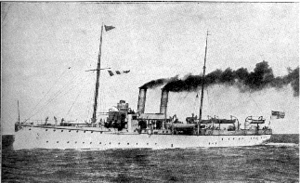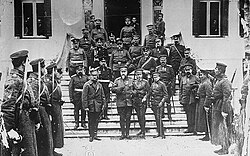| Agadir Crisis | |||||||||
|---|---|---|---|---|---|---|---|---|---|
| Part of the Causes of World War I | |||||||||
 SMS Panther in the Bay of Agadir | |||||||||
| |||||||||
| Belligerents | |||||||||
|
| |||||||||
| Commanders and leaders | |||||||||
|
| |||||||||
| Events leading to World War I |
|---|
 |
|
The Agadir Crisis, Agadir Incident, or Second Moroccan Crisis was a brief crisis sparked by the deployment of a substantial force of French troops in the interior of Morocco in July 1911 and the deployment of the German gunboat SMS Panther to Agadir, a Moroccan Atlantic port.[1] Germany did not object to France's expansion but demanded “territorial compensation” for itself. Berlin threatened warfare, sent a gunboat, and stirred up German nationalists. Negotiations between Berlin and Paris resolved the crisis on 4 November 1911: France took over Morocco as a protectorate in exchange for territorial concessions to German Cameroon from the French Congo.[2]
In Britain, David Lloyd George, then Chancellor of the Exchequer, made a dramatic "Mansion House" speech on 21 July 1911 – with the consent of prime minister H. H. Asquith and Foreign Secretary Sir Edward Grey, bypassing the non-interventionist majority in the Cabinet – that denounced the German move as an intolerable humiliation.[2] There was talk of war and Germany backed down; relations between Berlin and London worsened and the British moved closer to France. Berlin felt humiliated and began to dimly realize that it was operating with few allies and antagonizing multiple potential adversaries.[3]
- ^ "Agadir Incident | European history". Encyclopedia Britannica. Retrieved 12 April 2021.
- ^ a b Clark, Christopher (2013). The Sleepwalkers. HarperCollins. pp. 208–210. ISBN 978-0-06-219922-5. OCLC 1002090920.
- ^ Clark 2013, pp. 204–213.